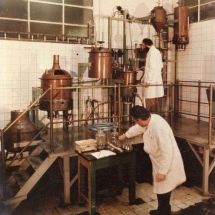 Dnešní Vysoká škola chemicko-technologická v Praze a její Ústav kvasné chemie a bioinženýrství odvozuje svůj původ od nejstaší inženýrské školy, založené v Praze v roce 1707 z podnětu vojenského odborníka K. J. Willenberka. Na této technice se vyučovala nejen stavba opevnění, mostů a cest, ale i nauka o zemědělství v rámci přednášek o rekultivaci krajin zničených válkou. V roce 1803 byla přejmenována na Královské české stavovské učiliště a do učebních plánů byla poprvé zařazena i výuka chemie a chemické technologie, včetně oboru, který dnes označujeme jako chemii přírodních látek.
Dnešní Vysoká škola chemicko-technologická v Praze a její Ústav kvasné chemie a bioinženýrství odvozuje svůj původ od nejstaší inženýrské školy, založené v Praze v roce 1707 z podnětu vojenského odborníka K. J. Willenberka. Na této technice se vyučovala nejen stavba opevnění, mostů a cest, ale i nauka o zemědělství v rámci přednášek o rekultivaci krajin zničených válkou. V roce 1803 byla přejmenována na Královské české stavovské učiliště a do učebních plánů byla poprvé zařazena i výuka chemie a chemické technologie, včetně oboru, který dnes označujeme jako chemii přírodních látek.
V roce 1816 byla poslána zemskému výboru žádost sládků a podstarších v Čechách, aby byla při technickém učilišti založena škola pro "odchovance průmyslu pivovarnického". První profesor chemie K.A. Neumann přednášel pouze lučbu a k výuce biologických disciplin, přistoupil až jeho nástupce, prof.J. Steimann (1779-1833), který do svých přednášek zařadil také nauku o chemických zásadách pivovarnictví, vinopalnictví a octářství. 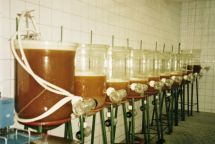
Po smrti prof. Steinmana převzal výuku chemie na pražské technice Karel Napoleon Balling (1805-1868), osobnost světového formátu. Prof. Balling byl i druhým rektorem utrakvistického (dvojjazyčného) polytechnického ústavu, řádným členem Královské společnosti nauk v Praze a dopisujícím členem Císařské akademie věd ve Vídni. Uveřejnil více než 30 obsáhlých knižních děl a mnoho odborných článků. Vynikal zvláště v oboru lučby a kvasných technologií. Dodnes velice známé jsou tzv. Ballingův cukroměr a cukroměrné stupně Ballingovy (°Bg). Balling také odvodil attenuační teorii kvašení a vzorec, později nazvaný Ballingův, podle kterého se z koncentrace alkoholu a skutečného extraktu v pivě vypočítá koncentrace původní mladiny. Tato jeho práce z minulého století je stále aktuální. Kromě toho Balling z pivovarské problematiky pracoval například na přípravě chmelových extraktů, které vstoupily do praxe teprve v 50. letech 20. století. 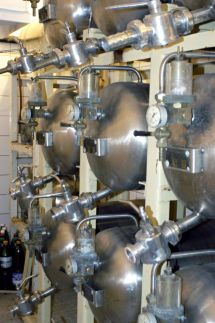
V roce 1869 byla technika rozdělena na dva samostatné Polytechnické ústavy Království českého, a to na německou a českou školu. Výuka pivovarnictví se soustředila do české techniky, od roku 1875 zestátněné pod názvem Český polytechnický ústav v Praze. V roce 1868 se na katedře prof. F. Štolby, nástupci prof. Ballinga, habilitoval docentem pivovarství Antonín Bělohoubek (1845-1910). Ten roku 1876 předložil vedení techniky návrh na zřízení samostatného oboru kvasné chemie. Tak se začal formovat dnešní Ústav kvasné chemie a bioinženýrství, tehdy pod názvem Ústav kvasné chemie a mykologie. Bělohoubek přednášel od roku 1873 kromě pivovarství další kvasné discipliny, agrikulturní chemii a také technickou mikroskopii a zbožíznalství.
V roce 1899 byl pověřen vedením Ústavu kvasné chemie a mykologie prof. Karel Kruis (1851-1917). Tento pedagog a vědec obohatil výuku kvasných technologií o enzymologii a další moderní biochemické a mikrobiální aspekty. Jeho velkou zásluhou byla také výstavba pokusného pivovaru a lihovaru na České vysoké škole technické v Praze, tehdy sídlící v Trojanově ulici.
V roce 1920 byla Česká vysoká škola technická v Praze přejmenována na České vysoké učení technické a Ústav kvasné chemie a mykologie byl tehdy začleněn do široce rozvíjeného chemického oboru. V té době ústav vedl prof. Jan Šatava, který byl později i ředitelem Výzkumného ústavu pivovarského a sladařského v Praze. Ten se mimojiné zasloužil o vybudování technologické haly v budově dnešní VŠCHT v Praze 6, Technická 5, dostavěné roku 1937. V této hale se opět realizoval pokusný pivovar a lihovar. Prof. Šatava zemřel v roce 1938, kdy nastalo smutné období likvidace českého vysokého školství a začaly tragické roky II.světové války. 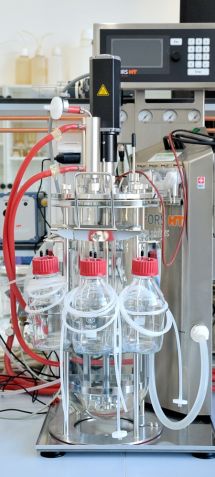
Po II.světové válce prodělal ústav řadu reforem, ve výuce se však příliš preferovaly teoretické přístupy a opomíjely se technologické a inženýrské principy kvasných výrob. To vedlo i ke zrušení pokusného pivovaru. V roce 1952 však na VŠCHT vznikla Fakulta potravinářské technologie, do níž byl zařazen ústav pod jménem Katedra kvasné chemie a konzervárenství, později Katedra kvasné chemie a technologie. Jejím vedoucím se stal prof. J. Dyr (1904-1980), který navázal na předválečný trend moderních technologických principů kvasného průmyslu a prohloubil výuku sladařství a pivovarství. Také se v této době rozšířila výuka biochemie a do výuky byla zařazena molekulární genetika.
V roce 1970 převzal vedení katedry prof. V. Grégr (1914-1991), odborník na lihovarství a výrobu mikrobiální biomasy. Za jeho působení byla katedra přejmenována na Katedru kvasné chemie a bioinženýrství. Po odchodu prof. Grégra do důchodu vedla v letech 1981 až 1997 katedru prof. G. Basařová, která se zasloužila o inovaci výuky, zejména sladařství a pivovarství prohloubením teoretických biologických a inženýrských znalostí a schopností aplikovat je na jednotlivé procesy fermentačních výrob. Po revoluci v roce 1989 nastala ve školství řada změn, otevřela se možnost mezinárodní spolupráce, zahraničních výměn studentů apod. V roce 1991 byla původní katedra přejmenována na Ústav kvasné chemie a bioinženýrství. Po paní prof. Basařové převzal vedení Ústavu kvasné chemie a bioinženýrství pan doc. J. Čepička, který ústav vedl až do roku 2002. Mezi roky 2002 a 2011 vedl ústav prof. K. Melzoch. Vedení následně převzal prof. J. Masák, který funkci zastával do roku 2023. Po něm se stala vedoucí ústavu prof. P. Pataková, která stojí v čele ústavu dodnes. 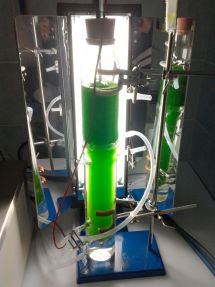
Výzkumné aktivity Ústavu kvasné chemie a bioinženýrství vycházejí z dlouholetých tradic pracoviště zaměřeného na studium tradičních a moderních biochemických technologií využívajících činnosti jednobuněčných organismů a jejich dopadu na kvalitu výrobků potravinářského a farmaceutického průmyslu. Po celou dobu svoji existence se ústav podílí na vývoji nových technologií směřujících k produkci kvalitních a zdravotně nezávadných potravin v oblasti nápojového průmyslu (pivovarství, lihovarství, vinařství), výroby organických kyselin (ocet, kyselina mléčná, citrónová, vinná,...), droždí, mikrobiální biomasy, organických rozpouštědel a celé řady biologicky aktivních látek (antibiotika, aminokyseliny, enzymy, ...).
Od 1.4.2012 je Ústav kvasné chemie a bioinženýrství přejmenován na Ústav biotechnologie.
